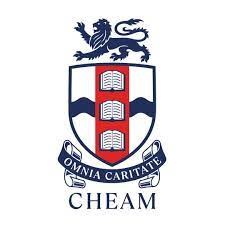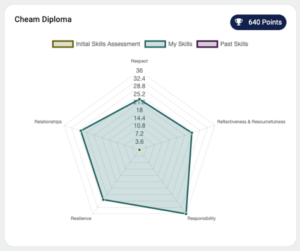The School
Cheam School is a boarding school in Berkshire, running from nursery to sixth form on the site, and is home to almost 400 children. Having been founded way back in 1645, it holds the distinction of being the oldest private school in England. In addition to this long and proud tradition, the school is very progressive and is adopting a novel way of embedding a character education approach.
Pastoral Care
Cheam School is aiming to achieve outstanding pastoral care and, with a dedicated team of teachers, ensure that all pupils are included and supported.
The school’s philosophy is: “For learning to be most effective we develop, nurture and see the whole child”. To be effective, the school provides an impressive array of opportunities in the Arts, Sports and Outdoor Pursuits, alongside academic life. There is also a focus on mental health and wellbeing as a priority every day.
As a consequence, not surprisingly, Cheam School has been ‘Highly Commended’ in the ‘Happiest Boarding School Award’ category by Muddy Stilettos in their annual ‘Best Schools Awards’.
The school now aspires to attain the ACE (Association for Character Education) Quality Mark and is aiming to become the gold standard for character education.
The Five R’s Character System
Consistent with this ambition, a character education system has been introduced, which they call their “5 R’s”, and the objective is to embed and positively reinforce this character framework over a two-year period.
The character categories are structured into five strands, namely:
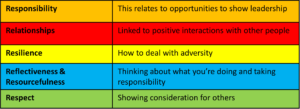
These categories appear self-explanatory. However, there are many other character attributes which feed into these five principles and the intention is to build a deeper self-awareness of character through activities around the school. Cheam School is also keen to demonstrate the link between experiences gained through boarding and growth in personal development through its belief that ‘boarding builds character’.
Points Make Prizes
In order to motivate pupils to participate and take the character approach seriously, the school has devised a points-based system which they want to use to reward learners, effectively quantifying character.
They have called it: ‘Diploma Points’.
How does it work?
Points are allocated to a wide range of different tasks under each ‘R’ character category. When students successfully carry out different tasks in the relevant lists which are housed on Kloodle, they receive the associated points. The points’ scale ranges from 1 to 10; 1 point is awarded for a basic activity, up to 10 points for something much more meaningful.
The tables below illustrate examples of the ranking of different tasks under each character category and the points attributed.
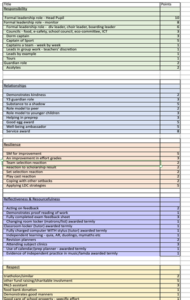
As learners accumulate points over the school year, they can gain awards: Bronze for 80 points, Silver for 100 points, Gold for 120 points. There are prizes and recognition for the students at the end of the school year or after events, such as a school trip.

The Power of the Positive Feedback Loop
Through the Diploma Points system, Cheam School is signalling what they value and expect in terms of the students’ behaviour, rewarding virtuous acts and providing insight into areas for growth and further improvement. When used strategically, positive feedback can reinforce the cornerstones of discipline and be a motivation for good behaviour. In contrast, constant negative feedback and criticism for poor behaviour can decrease a child’s confidence and self-esteem.
The Process of Character Development on Kloodle
The flowcharts below demonstrate the process of development of character on Kloodle from the students’ and teachers’ perspectives.
| Students | Teachers |
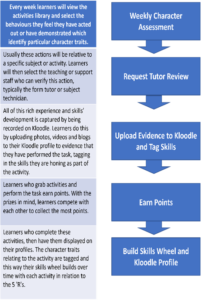 |
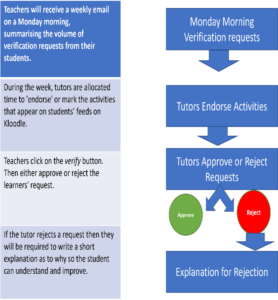 |
The process is initiated and driven by the students; this proactive approach is intended to celebrate and champion the behaviours which will create great leaders.
All of the rich experience and skills’ development is captured by being recorded on Kloodle. Learners do this by uploading photos, videos and blogs to their Kloodle profile to evidence that they have performed the task, tagging in the skills they are honing as part of the activity.
‘Brucie Bonus’ Points Are Available
There is also the potential for learners to earn extra ‘bonus’ points by getting marked ‘outstanding’ on the assignment or by reflecting on their experiences in doing the activities. Reflection is a very powerful component of the character development process, encouraging students to think more deeply about which skills or traits they are developing. Writing about it helps too! Students can reflect on their activities and then record their reflections on Kloodle.
The Skills’ Wheel aka The ‘Cheam Diploma’
Each individual student has what we call a ‘Skills Wheel’ on their Kloodle profile, which illustrates the growth in skill development and is perfect for what Cheam School is trying to achieve. Like all terminology on Kloodle, this is customisable; some schools might call it the ‘character wheel’, Cheam School has decided to call it the ‘Cheam Diploma’.
There is an option to ‘rate my skills’ through which students can attempt to rate their own skill levels before carrying out any activities. This can then become a benchmark to compare against once the students begin to upload evidence of performance. Often learners are surprised at how their actual skill assessment is different from what they originally thought!
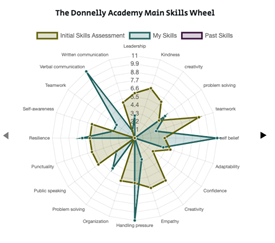
The Cheam School skills’ wheel has a pre-set target value which students aim towards over the year.
“Forsan et Haec Olim Meminisse Iuvabit”
Virgil wrote the Aeneid in 19 BC, the epic story about Aeneas’ perilous journey from Troy to Italy. After experiencing numerous setbacks, Aeneas addresses his men by telling them that one day in the future they will look back and laugh about all the adversities they had encountered; the idea being that overcoming suffering and misfortune can build resilience and result in happiness later on.
Strength in adversity.
In a similar way, a very interesting and crucial aspect of the Cheam Diploma is that the school is keen to recognise behaviours that would not traditionally have been lauded in a school environment or ones that children wouldn’t typically think of as an achievement. Often from failure or missing out come the most meaningful and memorable lessons in life, especially if young people get into the habit of reflection. Children would typically not recognise these types of learning experiences as the focus is usually on success. In fact, greater lessons are often learnt, and character developed, through difficult times.
So, when an individual student is dropped from the cricket team, for example, or has to re-sit a Latin test, these are activities which are highlighted for them. The student then ‘grabs’ the allocated activity from Kloodle and can actually earn points if they can demonstrate resilience or respect as a result of their reflection and experience.
Thus, the Cheam Diploma should present a huge impact into the behaviours and attitudes of these young people at the school, an impact that can be described as ‘revolutionary’.
Show Their Story Forever and Ever
Learners can use Kloodle for general reflections and to evidence all other experiences and skills they undertake in school or elsewhere, say at home, to build up a richer record of achievement and enabling them to show their story. The ‘Record of Achievement’ feature on Kloodle can act as a great replacement for their termly or annual certificates at the school.
Another great advantage of being on Kloodle is that learners can keep their profiles forever, beyond education, offering a lasting positive legacy of the character programme delivered by the school. Cheam School likes the idea that learners will be able to use their profiles in connection with applications in the future and ultimately could use the information to complete university entrance or CV writing. More senior students would be encouraged to utilise the ‘my cv’ section on Kloodle.
There is also the possibility for teachers to show children’s profiles to their parents to demonstrate the richness of character they are developing.
Let’s Get Going Then…
The Cheam School initially started with a cohort of 14 pupils overseen by a handful of staff in order to begin to embed the programme and iron out any issues before, excitingly, rolling it out to the full school. As you can see from the dashboard below, after a successful trial period, the school has expanded the number of learners on Kloodle.
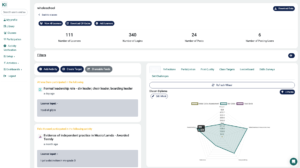
The full school will set the example of leadership in character education. Watch this space!”

